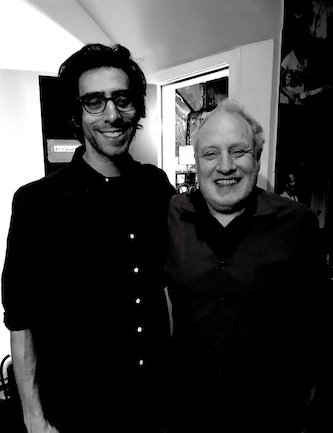Jazz Album Review: “Arcades” — Beautifully Speculative Sounds
By Michael Ullman
This is free jazz perhaps, but it never sounds frantic, wild, or abandoned.
Anthony Coleman and Brian Chase, Arcades (Chaikin Records)

Cover art for Arcades.
Sixty-six year old Anthony Coleman is probably best known for his many recordings with John Zorn. A teacher at the New England Conservatory from which he graduated, he’s also a wide-ranging composer for what seems to me almost any kind of ensemble. For instance, his “Diet on Cod” (from Lapidation) features a trio of alto saxophones, a bassoon, accordion, electric guitar, and the usual rhythm section. He’s the only person I know who has written for bass harmonica. He can be witty in his titles and inspirations, and also a little grim. In the ’90s he led the Self-Hater Orchestra; one of his NEC Ensembles was called Survivors Breakfast. When he was asked to contribute to Winged Serpents: Six Encomiums for Cecil Taylor, he created a somber solo piece called “April 5, 2018,” the day of Taylor’s passing. On the brighter side, he also recorded Freakish: Anthony Coleman Plays Jelly Roll Morton.
The title Arcades owes something to the oddball, unfinished opus of German/Jewish philosopher Walter Benjamin, his Arcades Project, philosophical/political analysis of Parisian arcades, which were a double line of shops huddled under a glass roof. Coleman’s partner in this series of free improvisations is the remarkable percussionist Brian Chase, who is also the proprietor of Chaikin Records. Benjamin was a lifelong “flâneur” and heard a lot of chatter as he made his purposely aimless wanderings through Paris. With that in mind, the title cut, “Arcades,” sounds like a witty, cleanly worded conversation from its opening. The track begins with the simultaneous intermingling of a cymbal crash and a sharp plink high in the treble of the piano, which is echoed in the bass. The recording spreads the piano across the sound stage in a way that dramatizes the meditative independence of Coleman’s hands, the way he seems to speculate as he plays. Chase adds equally sparse, rapid sounds, a few clicks of his sticks, a single bass drum hit and a mini-roll on the tom tom, clicks and clacks that somehow are intriguingly linked to what Coleman is playing. Coleman’s piano sometimes sounds as if he were plucking the strings, or playing a prepared, muffled series of sounds. Every unusual technique fits, every contrivance sounds natural.

Anthony Coleman and Brian Chase. Photo: Bandcamp.
One can feel the way the two musicians are listening to each other. As “Arcades” progresses, there’s a gradual crescendo. Coleman plays a repeated phrase that suggests to me one reason that these duets are so satisfying — the pianist uses his instrument as a percussive device. When he is playing continuously, in a style derived perhaps from Cecil Taylor, Coleman still manages to suggest shifting rhythms, even moods. About eight minutes into the title cut, the pianist suddenly subsides. Soon Coleman is tiptoeing around the piano in what sounds like a dainty three-way conversation, his left and right hands seemingly chattering at each other.
Interestingly, both “Momentary Come-on” and “With Cunning” start off with the same phrase on the piano. Perhaps “With Cunning” is a second take, or perhaps Coleman wasn’t finished with that idea. “Divagations” opens quietly and musingly, with a held note at its center. Eventually, surprisingly, we hear some rattling sounds from the piano that are momentarily echoed by the drums. It’s as if the piano is striving to be percussive and the drummer wants to play melodies. The title, “Divagations,” may owe something to French poet Stéphane Mallarmé book of prose poems of that name. It is played softly and precisely. This is free jazz perhaps, but it never sounds frantic, wild, or abandoned.
In one of his published conversations, Steve Lacy talked about what it takes for a musician to play with the kind of freedom exhibited on this disc: “To be free, to play freely, all of that involves knowing, knowing perfectly what you want to do. The more you know what you should do, the more you are free. It’s not a matter of knowing nothing, but rather of knowing everything.” Arcades demonstrates what Coleman and Chase know together, and what they dare to try.
Editor’s Note: The release will coincide with a Brian Chase residency at The Stone NYC during the last weekend of March, closing with a duo performance of Coleman and Chase on the final night (3/26) to celebrate Arcades.
Michael Ullman studied classical clarinet and was educated at Harvard, the University of Chicago, and the U. of Michigan, from which he received a PhD in English. The author or co-author of two books on jazz, he has written on jazz and classical music for the Atlantic Monthly, New Republic, High Fidelity, Stereophile, Boston Phoenix, Boston Globe, and other venues. His articles on Dickens, Joyce, Kipling, and others have appeared in academic journals. For over 20 years, he has written a bi-monthly jazz column for Fanfare Magazine, for which he also reviews classical music. At Tufts University, he teaches mostly modernist writers in the English Department and jazz and blues history in the Music Department. He plays piano badly.
